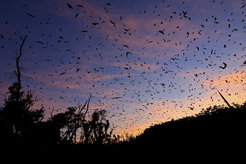ICARUS flies with new wings
With ICARUS 2.0, the space-based animal tracking system launches plans for a dedicated fleet of five CubeSats in low Earth orbit
The original ICARUS system, hosted on the International Space Station (ISS), was developed in collaboration with the Russian space agency, Roscosmos. However, all research projects with Russia were halted at the onset of the war in Ukraine, including ICARUS. Now, a partnership between the Max Planck Society and German NewSpace startup Talos has launched ICARUS 2.0. The 4-year partnership will give ICARUS its own independently-operated and dedicated fleet of at least five CubeSats in low Earth orbit (LEO).

The partnership will set a new course for tracking animal movements using satellite-based technology. ICARUS 2.0 will be available globally and allow for comprehensive research into biodiversity loss, climate change, and the spread of animal disease.
The advanced system will enable high-precision tracking of animals with GPS-accuracy. It will also provide researchers with animal location updates at least once a day, with the potential for updates up to five times per day once all five satellites are operational. In addition to location data, the five-gram tags attached to animals will measure temperature, humidity, pressure, and acceleration, offering a comprehensive dataset to support diverse research objectives.
Martin Wikelski, pioneer of the ICARUS project, says the collaboration between the Max Planck Society and Talos continues the legacy of ICARUS and its mission to explore the frontiers of animal behavior and global biodiversity.
“ICARUS 2.0 will be a critical tool for addressing environmental challenges, including climate change, conservation, and zoonotic disease tracking such as SARS, bird flu and the West Nile virus,” says Wikelski who is a Director of the Max Planck Institute for Animal Behavior. “By leveraging space technologies and collaborating with innovative space startups, the ICARUS initiative benefits from faster development cycles and enhanced capabilities, further expanding its reach and impact in global scientific research and conservation efforts.”
TALOS is a Munich- and Dresden-based NewSpace startup and a leading innovator in animal tracking technologies. TALOS CEO, Gregor Langer, says: “ICARUS 2.0 represents a transformative leap in animal tracking and environmental science. Together with the Max Planck Society, we are empowering scientists worldwide to gain deeper insights into our planet's ecosystems and the movements of animals on an unprecedented scale. Thanks to the increasing affordability of space technologies and satellite launches, space startups like TALOS are emerging as key players in advancing scientific research, effectively supporting research institutions in delivering real solutions for life on Earth.”
The ICARUS 2.0 mission aims to launch the CubeSat constellation in phases. The payload is already being built, and production of the first satellite will begin as part of the SpaceX Transporter 16 mission with deployment targeted for spring 2026. The full constellation of five satellites is expected to be operational by end of 2026.












